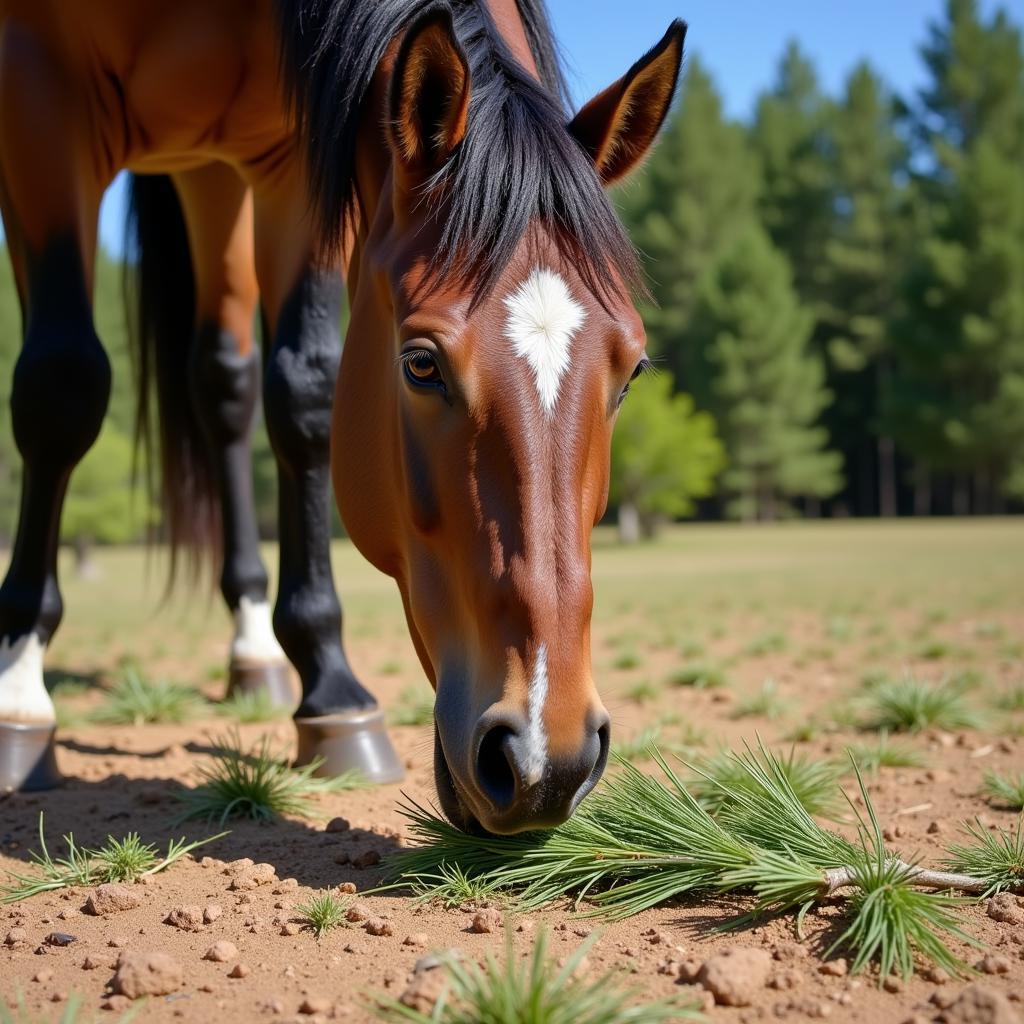Horses and pine needles – a combination that raises a lot of questions for horse owners. While horses are grazing animals, their digestive systems can be sensitive. Understanding what they can and cannot eat is crucial for their health and well-being. So, Can Horses Eat Pine Needles? The short answer is: it’s complicated.
The Potential Dangers of Pine Needles for Horses
While a few nibbles might not cause immediate harm, pine needles contain isocupressic acid, which can be toxic to horses, especially pregnant mares. This acid can cause premature labor, abortions, and other reproductive issues. Even non-pregnant horses can experience digestive upset, colic, and other health problems after ingesting a significant quantity of pine needles. The severity of these issues depends on factors such as the type of pine, the quantity consumed, and the individual horse’s sensitivity.
Many pine trees, especially ponderosa pines, lodgepole pines, and Monterey cypress, are particularly harmful to horses. The toxins in these trees can interfere with the horse’s normal bodily functions, leading to serious complications. It’s always better to be safe than sorry when it comes to horses and pine needles. Keeping your horses away from areas with a high concentration of pine trees is the best way to prevent potential problems.
Did you know that some horse owners decorate their stables for Christmas? Check out these horse stall Christmas decorating ideas for inspiration.
 Horse Eating Pine Needles: Is it Dangerous?
Horse Eating Pine Needles: Is it Dangerous?
What to Do If Your Horse Eats Pine Needles
If you suspect your horse has ingested a large quantity of pine needles, contact your veterinarian immediately. Signs of pine needle toxicity can vary but may include loss of appetite, lethargy, colic, difficulty breathing, and premature labor in pregnant mares. Early intervention is key to minimizing the negative effects. Your veterinarian can diagnose the problem and administer the appropriate treatment. Time is of the essence in these situations, so don’t hesitate to seek professional help. Remember, prevention is always the best medicine. Keeping your horse’s environment safe and free from potentially hazardous plants like certain pine trees is crucial for their long-term health.
Wondering about other potential hazards for your horse? Check out more information about Horse Thief State Park.
Creating a Safe Environment for Your Horse
Preventing access to pine trees is the best way to protect your horse. This may involve fencing off areas with pine trees, regularly cleaning up fallen needles in pastures, and providing ample alternative foraging options. Consider planting horse-safe trees and shrubs in your pasture and ensuring your horse has access to plenty of fresh hay and grass. This will reduce the temptation for them to nibble on potentially harmful plants like pine needles. A well-maintained pasture with diverse, safe forage is key to a happy and healthy horse.
Ever been to White Horse Creek, Oregon? It’s a beautiful place for horse lovers!
Alternatives to Pine Shavings for Horse Bedding
While pine shavings are a popular bedding choice for horse stalls, the aroma can be tempting for some horses to nibble on. If you are concerned about your horse eating pine shavings, consider alternatives such as straw, wood pellets, or shredded paper. These options are generally less appealing to horses and offer similar absorbency and comfort. Remember, your horse’s safety and well-being should always be your top priority when selecting bedding materials.
Conclusion
So, can horses eat pine needles? The answer remains a resounding no. While the occasional stray needle might not cause significant harm, the potential risks associated with pine needle ingestion are far too great. Prioritizing a safe environment, free from these potentially toxic plants, is essential for maintaining your horse’s health and happiness. By taking proactive measures, you can ensure your equine companion thrives in a safe and nurturing environment.
FAQs
- What are the signs of pine needle poisoning in horses? Signs can include colic, lethargy, loss of appetite, difficulty breathing, and premature labor in pregnant mares.
- Which pine trees are most toxic to horses? Ponderosa pines, lodgepole pines, and Monterey cypress are particularly dangerous.
- What should I do if my horse eats pine needles? Contact your veterinarian immediately.
- Are there safe alternatives to pine shavings for horse bedding? Yes, options like straw, wood pellets, and shredded paper are available.
- How can I prevent my horse from eating pine needles? Fence off areas with pine trees, clean up fallen needles, and provide ample alternative forage.
- Can horses eat any type of pine tree? No, all pine trees pose a potential risk to horses due to the isocupressic acid.
- Are dried pine needles more or less toxic than fresh ones? Dried pine needles still contain toxins and can be just as harmful.
Need help choosing the perfect Christmas gift for a horse lover? Check out these horse Christmas sayings.
For any further support, please contact us at Phone: 0772127271, Email: [email protected] or visit us at QGM2+WX2, Vị Trung, Vị Thuỷ, Hậu Giang, Việt Nam. We have a 24/7 customer support team.